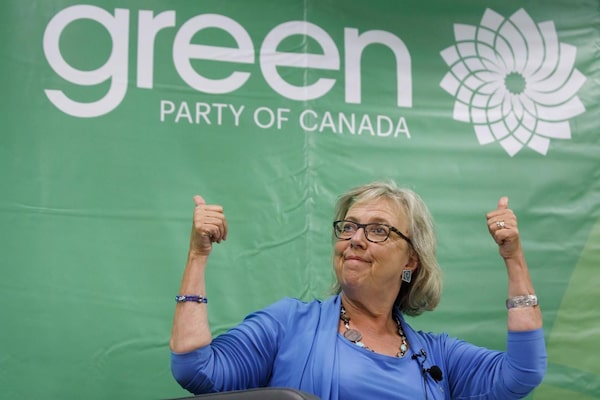
Green Party Leader Elizabeth May, seen here, said at a news conference in Halifax that the party also approved the release of 21 reports from the Parliamentary Budget Office that provide independent cost estimates of specific promises.The Canadian Press
Green Party Leader Elizabeth May revealed on Wednesday that her party plans to raise billions from corporations and high-income Canadians in order to pay for its ambitious campaign promises in areas like fighting climate change and launching universal pharmacare.
The party says its plan would increase federal spending by more than $60-billion a year, raise federal revenue by $70-billion a year and balance the budget within five years.
The sources of new tax revenue include several items that overlap with the NDP platform, such as a higher corporate tax rate, imposing a wealth tax, and ending tax breaks like the stock-option deduction that generally benefit high-income Canadians.
The party also approved the release of 21 reports from the Parliamentary Budget Office that provide independent cost estimates of specific promises.
“The Parliamentary Budget Office has done an amazing job,” Ms. May said at a news conference in Halifax. "We know that we have the revenue coming in to cover some very large new programs.
"We are able to put forward to you a budget that is balanced in five years, but to do that we have a number of really large new revenue pieces.”
The PBO cautions that its estimates of the revenue impact of some Green Party policies are highly uncertain.
For instance, the Green Party said it will raise over $15-billion a year by imposing a 0.5-per-cent tax on all financial transactions, such as the sale of stocks and bonds. The PBO said the revenue figure could be off by a factor of two or three in either direction, attributing the high level of uncertainty to the fact that “a financial tax of this scale has not been tried in an open economy before.”
Werner Antweiler, an environmental economics professor at the University of British Columbia’s Sauder School of Business, said the Green Party’s proposed new taxes are not likely to raise the billions that the party expects.
“It’s clearly a proposal by a party that doesn’t think they’re going to be forming the next government,” he told The Globe, after reviewing the party’s fiscal plan. Mr. Antweiler said the proposed transaction tax would simply encourage financial transactions to take place outside of Canada.
“The number is completely unrealistic because of the very, very substantial risk that companies and individuals can choose where to transact and you can move things offshore quite easily today,” he said. Mr. Antweiler also said some of the party’s other promises – such as phasing out bitumen production for fuels by 2035 – cannot be done without the provinces.
“I think shutting down the oil sands is mostly wishful thinking," he said.
The Green Party released a platform earlier in the campaign that did not include a financial breakdown. Ms. May said the party was still working with the PBO on specific items. The costing document released Wednesday includes some changes from the party’s original document. Ms. May said the PBO’s estimated cost for pharmacare – growing to over $30-billion a year before considering provincial contributions – was higher than expected. As a result, the party added some last-minute tax increases to the platform.
The second page of the party’s costing document suggests the party can raise $18.5-billion in new federal revenue for the 2018-19 fiscal year. That year ended on March 31 and the Finance Department has already closed the books. When asked, a party official said that was a “formatting error” and that section will be relabelled.
The Green Party plan received positive reviews from the left-leaning Canadian Centre for Policy Alternatives, which releases an annual alternative budget and has long called on Ottawa to end the various tax breaks that benefit high-income Canadians.
“On the revenue-raising side, I think these are good ideas,” said CCPA senior economist David Macdonald, who noted that many of the Green Party’s promises overlap with his organization’s alternative budget.
Mr. Macdonald said he’s skeptical of the argument that higher taxes on corporations and high-income earners will chase money out of the country.
“In many cases, their interests are in Canadian companies that operate in Canada, so in that sense, they’re tied to Canada," he said.
Carleton University economics professor Frances Woolley said she questions whether the party’s proposed funding for child care – which starts at $1-billion a year and rises over time to $5-billion – is enough to meet the definition of a “universal” program.
“It would take a lot more money than the Green Party is planning to spend any time in the next four years to establish universal child care in Canada,” she said.
 Bill Curry
Bill Curry